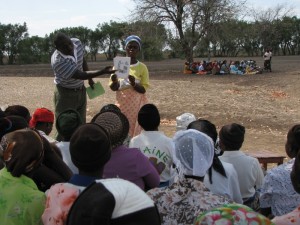Creating ‘Common-Unity’ and ‘Vehicles for Development’ Through Community Health Clubs
UMZHIMKHULU GEARING FOR GROWTH AND DEVELOPMENT: Municipal News.
Published by the Municipality of Umzhimkhulu, Dec. 2008
Starting in October 2008, selected villages within the Umzimkhulu Municipality will begin their training as members of Community Health Clubs (CHC), a new initiative piloted by Africa AHEAD for the Department of Water Affairs and Forestry’s (DWAF) Integrated Water Resources Management (IWRM) program. As part of the South African Government’s initiative to improve community use and management of water resources, the residents of these villages will be joining the first wave of what hopes to be a nationwide movement of health conscious and empowered communities.
The Community Health Club strategy enables the poorest of the poor in urban and rural communities to take full control of their own development by building effective social structures at the grassroots level, using health promotion as an entry point. This strategy, as developed and implemented by Africa AHEAD, follows a four phase process: 1) health promotion, 2) community provision and management of water and sanitation resources, 3) sustainable livelihoods, and 4) social responsibility. The training provided by Africa AHEAD builds each community’s capacity to manage their own health and development, ensuring that all initiatives are fully sustainable and holistic in scope. These goals are achieved through the creation of ‘Common-Unity’, which is at the heart of any healthy ‘Community’.
Community Health Club Members during a health promotion session.
The health promotion phase lays the foundation for developing this ‘Common-Unity’ through weekly sessions held over the course of 6-7 months. During these sessions, members are encouraged to discuss issues surrounding common health topics through the use of visual aids and participatory activities. Apart from actively participating in the health promotion sessions, members are also encouraged to support each other when they put their new knowledge into practice at home. To further enhance participation and ownership of CHC activities, Membership Cards are distributed to all those who join a Club. These cards both bond the members through a shared sense of identity and allow each member to monitor their own individual progress through the health promotion phase. This sense of ownership, combined with active participation and consensus building, in short, ‘Common-Unity’, is the hallmark of any successful health and development project and the CHC strategy emphasizes this focus throughout.
Graduation days are held once each CHC has successfully completed all of the health topics. These days are public affairs meant to honor the commitment and accomplishments of each club and their individual members. Club members are given the opportunity to share their new knowledge and practices through the songs, poems and dramas they have developed, while each member who successfully completed all of the health topics is presented with a Graduation Certificate. Those members with Graduation Certificates are then invited to identify their priority needs and, with assistance and support from DWAF, Africa AHEAD, and other stakeholders, to develop appropriate plans and projects to meet those needs.
It is at this point that each CHC will be ready to use their ‘Common-Unity’ to transform their club into a vehicle for development. These ‘vehicles’ will take each community down a different road, with some working towards improving their water and sanitation infrastructure, some investing in herb and nutrition gardens to improve food security, and others still choosing to focus on support for the elderly and the sick. Once these initial projects have begun successfully, many roads that were once closed can now be opened and CHCs allow each community to chart their own course to development. This flexibility in programmatic objectives that the CHC strategy allows, which are identified and reached by community members themselves, is the strength of developing ‘Common-Unity’ and a ‘Vehicle for Development’ through Community Health Clubs; the ability to address the diverse and localized health and development challenges facing the residents of Umzimkhulu through shared beliefs, practices, and priorities.

